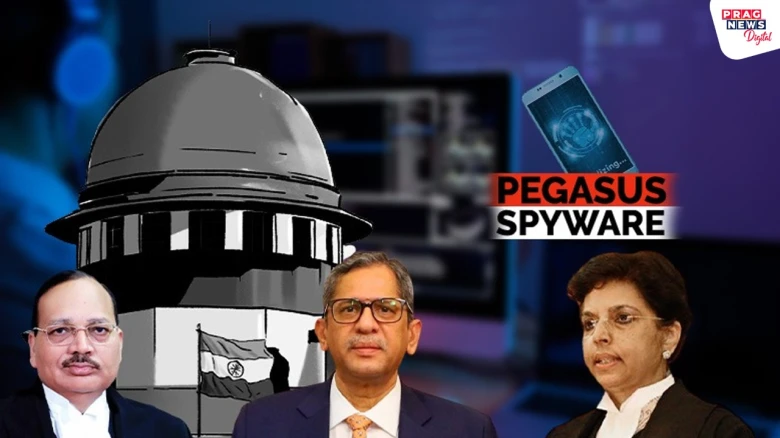Sports

As a result, the Supreme Court stated that it was reluctant to make the report available to the public and that it would instead consider offering a censored version.
Digital Desk: The independent committee looking into claims of unauthorized spying using Pegasus spyware issued a sealed cover report, which
the Supreme Court officially received on Thursday.
Orally, a bench made up of Chief Justice of India NV Ramana, Justice
Surya Kant, and Justice Hima Kohli observed that the Government of India had
not cooperated with the Committee and had maintained its position before the
Court, refusing to express clearly whether the spyware had been purchased or
not.
"The Indian government, according to the committee, has not
cooperated. You adopted the same position there as you did here."
Solicitor General Tushar Mehta was informed by CJI Ramana.
According to
the Solicitor General, he is not aware of that. The bench also observed that
out of the 29 devices that were sent to the Technical Committee, malware was
discovered in 5 of them.
Whether
Pegasus was actually the malware is unknown. Members who turned in their phones
also asked that the report not be made public.
As a result,
the Supreme Court stated that it was reluctant to make the report available to
the public and that it would instead consider offering a censored version.
However, the bench declared that it would make the report provided by
the supervising Judge, Justice RV Raveendran, public. Raveendran's report
included recommendations for safeguarding citizens, future courses of action,
accountability, amending the law to improve privacy protection, grievance
redressal mechanisms, etc.
As for the size of the report, CJI Ramana remarked, "Let's see what
portions we can provide...These are technological challenges. As for
Raveendran's report, we will upload in website. No problem."
The three parts of the technical committee's report were submitted. It
includes information on malware, publicly available research, material taken
from private mobile devices that may include sensitive data, etc. The report is
secret and not intended for public circulation, the Committee has warned. A
file containing the answers to the committee's questions was also delivered to
the court.
The bench was deliberating a number of petitions asking for an
independent investigation into claims that the Israeli spyware Pegasus was used
to target journalists, activists, and politicians for monitoring.
An expert group led by former Justice RV Raveendran of the Supreme Court
was assembled by the court in October 2021 to look into the situation.
After determining that the petitioners had established a case and that
the Center had not provided clarification in the subject, the Court appointed
the investigation committee.
In a ruling that emphasized the value of free expression and the freedom
of the press while also raising concerns about unauthorized surveillance, the
bench chaired by Chief Justice of India NV Ramana held that the State's claim
of national security did not completely preclude judicial review.
The Central Government had claimed that it was a matter of national
security and had declined to say whether or not it had employed Pegasus
spyware. The Court rejected the Center's defence, stating that the State cannot
be granted a pass simply by citing national security. The Court also denied the
Centre's request to create a technical committee, stating that an unbiased
investigation required an independent body.
On July 18, the Pegasus issue began when The Wire and a number of other
foreign publications released articles about the mobile numbers that could have
been the targets of the spyware service provided to many governments, including
India, by the NSO business. According to a media outlet called The Wire, the
list of targets reportedly includes 40 Indian journalists as well as political
figures like Rahul Gandhi, electoral strategist Prashant Kishore, and former
ECI member Ashok Lavassa.
Leave A Comment